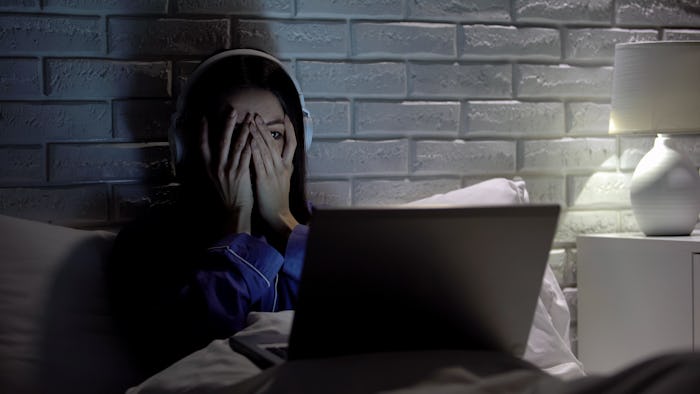Life

These Are The Lingering Effects Of Those Scary Movies You Just Can't Stop Watching
Halloween and creepy, crawly, spooky movies go hand in hand in our house. While I’m kind of a wimp and can’t handle anything too horrific, many people take October as the time to re-watch all of their horror favorites. I’ve always wondered, are there lingering effects of scary movies?
I know when I personally watch something scarier than Beetlejuice, I feel like every noise and shadow is intensified. I hear things, I see things, and I’m beyond creeped out and cannot sleep because I just know if I let my guard down *something* is going to get me. Why is this? And why are some people more wimpy when it comes to watching scary movies than others? For example, I watched The Ring in theaters when it first came out, and I was thoroughly terrified that I slept with the TV on for some noise and light (which in hindsight is kind of stupid since *spoiler alert* she came out of the TV). However, at like 3 a.m., I kid you not, my television screen went to snow like in the movie and I screamed out loud. How was that a coincidence, y’all? I was in high school and I think I went to go sleep on my couch in the living room away from my TV that night.
Now before you go making fun of me, there is a reason behind this and why it affects some people more than others according to experts.
"I don’t know that there is scientific evidence for this — or even any way to measure it," says Christy Monson, a licensed marriage and family therapist.
"I have found in my practice that those who are more sensitive to other’s feelings and emotions are more readily drawn in to the action in a horror or scary movie. They experience the drama with greater intensity than others do, so they are more frightened," she says. And there's also a lot of science as to what happens to our brains while we are watching the scary movie and after it's over. "The mind can’t tell the difference between the real and the imagined. That’s why mantras and guided imagery can help us heal," says Monson.
"When someone watches or experiences something scary, the part of the brain that processes emotions (fear, feeling creeped-out) runs rampant. The front part of the brain doesn’t regulate the emotions, so emotions go wild."
Monson explains that when we're exposed to "real or imagined tragedy," there's a surge of the stress hormone that destroys the brain cells where memories are recorded — "that’s why after something stressful or tragic, we can feel confused." Additionally, "The part of the brain that processes emotion — including fear — goes into alert mode, looking for threats, listening for sounds everywhere. Meanwhile the front part of the brain — which is supposed to regulate emotions — shuts down somewhat and doesn’t work as well as it did before," she continues.
"So, with the memory section of our brains under-functioning and the part that regulates emotions is also under-functioning, you can see why our emotions go wild at a time like this."
As far as why we have a hard time falling asleep after watching a scary movie, Martin Reed, a certified clinical sleep health educator (CCSH) and the founder of Insomnia Coach says that "watching a scary movie right before bed can activate the arousal system — and this can temporarily override sleep drive and make sleep more difficult. The arousal system is, in effect, a protection mechanism since it allows us to suspend sleep whenever there is a perceived threat or danger."
To help ease some of the effects you feel after watching a scary movie, Monson suggests practicing mindfulness "by sitting in a quiet place and observing the light around you, and being aware of your breathing." She also suggests picturing a beautiful place while experiencing all the senses from that location, e.g., listening for the sounds, smelling the smells, taste the tastes, enjoying the light around you, and feeling the warmth.
So if you're more empathetic in general, scary movies will definitely affect your more than those who aren't as empathetic. But if you still find yourself compelled to watch, just try to remember that it's all just a bunch of hocus pocus.
Experts:
Christy Monson, a licensed marriage and family therapist
Martin Reed, a certified clinical sleep health educator (CCSH) and the founder of Insomnia Coach